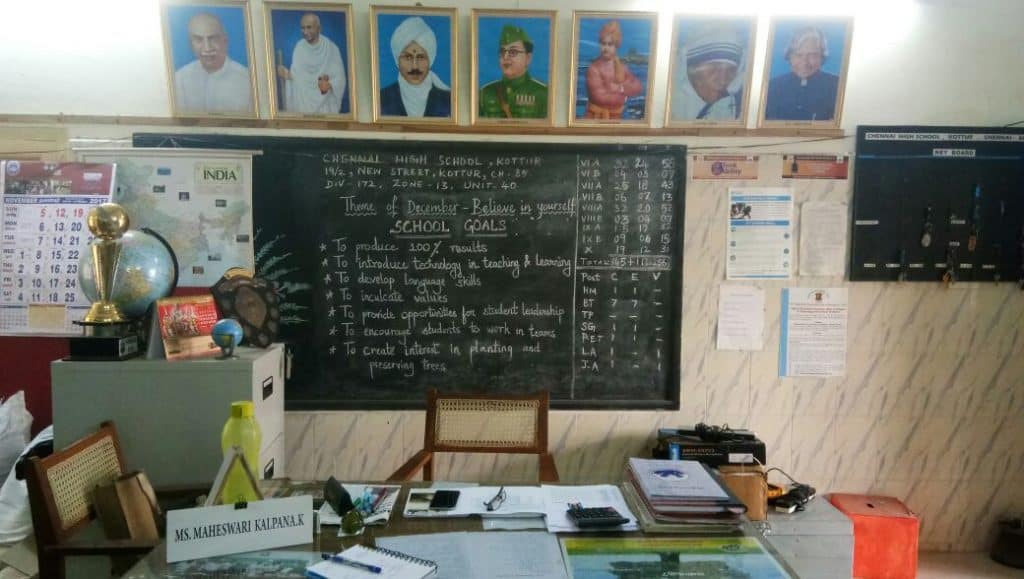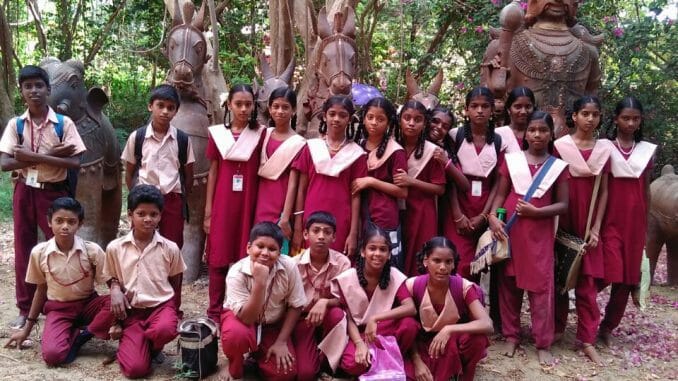A Children-centric Chennai school
Unkempt buildings, broken toilets, steep absenteeism and disinterested students? Fits your idea of a government or Corporation school? Think again.
Perceptions and ideas develop over time and, once hardened, it is rather difficult to demolish them. While there’s no denying the fact that such schools continue to exist, the opposite holds true as well. And, one such example is the Chennai High School in Kottur. With a renewed focus on obliterating absenteeism and moulding well rounded individuals, the team of teachers led by an inspiring and resourceful Head Mistress is making heads turn.
Tackling absenteeism in Chennai Schools
Absenteeism is one of the biggest issues Corporation-run schools have to endure, and Maheswari Kalpana, the Head Mistress (HM) of the Chennai High School in Kottur is no stranger to this. Just over three years back, the school was reeling under the pressure of high absenteeism, coupled with lack of focus and low self esteem among the students who did come to school. It reached a point where something drastic had to be done to prevent a collapse.
“When I took over as the Head Mistress, students weren’t motivated enough and the most overwhelming of them all was increasing absenteeism. We had to get the children to come to school; otherwise of what use was all this?” remarks HM Kalpana.
But, change doesn’t come easy, especially in a system rife with red tape. Persistence, determination and an interested set of teachers and administrators are pivotal for effecting even minor alterations to routine practice.
The core team led by the Head Mistress herself zeroed in on a fool-proof plan–calling parents to find out why their children missed school. Teachers had to report directly to the HM to keep her up to date about everyday attendance and the reasons for absence. “Teachers were made responsible for their class’ attendance. So, when teachers began enquiring parents about their children’s absence, the noose tightened on the other end as well and over time attendance improved, as expected,” informs HM Kalpana.
Increasing parents’ involvement
A considerable number of children come from homes with single parents who are hardly around to track what’s happening with their child in school, or are illiterate themselves, making scrutinizing school work all the more difficult.
Parents’ support being crucial to all this, the HM had set up an informal system where parents could come at their convenience to discuss about their children’s general progress, making the school and the Head Mistress’ office more accessible to them.
“If we ask all the parents to come on a particular day with a rigid time slot, there is a very high possibility that most parents would miss it. Instead, we have a rather relaxed system where parents meet me or the teacher concerned after school hours based on their convenience,” says HM Kalpana.
Building confidence
Most children were found struggling to communicate with confidence despite English being the medium of instruction in many of the Chennai Schools. The proactive school administration, with assistance from Teach for India fellows stationed in the school, took it upon themselves to improve the communication skills of students through a variety of activities from essay writing to oratorical competitions. In addition to this, a bunch of interested volunteers from varied backgrounds come in to tutor the students after school hours.
“Five teachers cannot do everything; and the importance of volunteers just cannot be overemphasized. We have had fellows from Kalakshetra coming in to teach our children dance and music. Few others take time out to teach craft work. School should be a child-centric, happy place and all these activities contribute profoundly to the overall development of children,” the HM notes.
Positivity begets positivity
All these minor modifications over time have made a major impact on the students and parents alike.
Vennila’s son just completed his Class X board examinations. She recalls how his class teacher used to call her every morning to make sure her son doesn’t miss the special classes conducted in school. “Even if my son were in a private school, I doubt he would have been cared for so much. The concern and interest shown by teachers in the school make all the difference,” she asserts.
Teachers know most of the students not only by name but also have a thorough understanding of their family situation given that many children come from broken families and single parent households. The children in turn look up to their teachers who double up as role models providing the much needed support–both moral and emotional–to help children from going astray.
Two of daily wage labourer Velu’s children study here and he says he couldn’t be happier. Being illiterate, following what happens in school is a big challenge but he is relatively at ease looking at the rapport his children share with their teachers. “My children are blessed with the best teachers; it doesn’t worry me so much that I don’t follow what’s happening in school,” he says. His daughter who is in Class IX recently appeared in an eligibility test conducted for students to visit NASA headquarters in the USA. Though she didn’t make it, the little girl’s experience is something the entire family is very proud of and they all have only the school and its teachers to thank for.
While securing 100 percent positive results in board examinations figures among the top priorities, teachers recognise that grades aren’t everything. The Head Mistress believes that it is equally important to instill strong ethical and moral values along with focus on academics for students to come out as capable and competent individuals. “Every school aspires that its students should become good citizens, but our dream is that each of our children should goes on to become a leader in society.
(Way back in 1912, the Education Department of the Corporation of Madras began functioning with a total of 40 primary schools under its jurisdiction. Today, the Greater Chennai Corporation maintains 313 schools–139 Primary, 109 Middle, 38 High Schools and 27 Higher Secondary Schools in all.)



Indeed this lady Kalpana is doing awesome work !! Hats off to her and her team! I’m sure all the students of this school will do that much better in life than their peers in other less fortunate schools